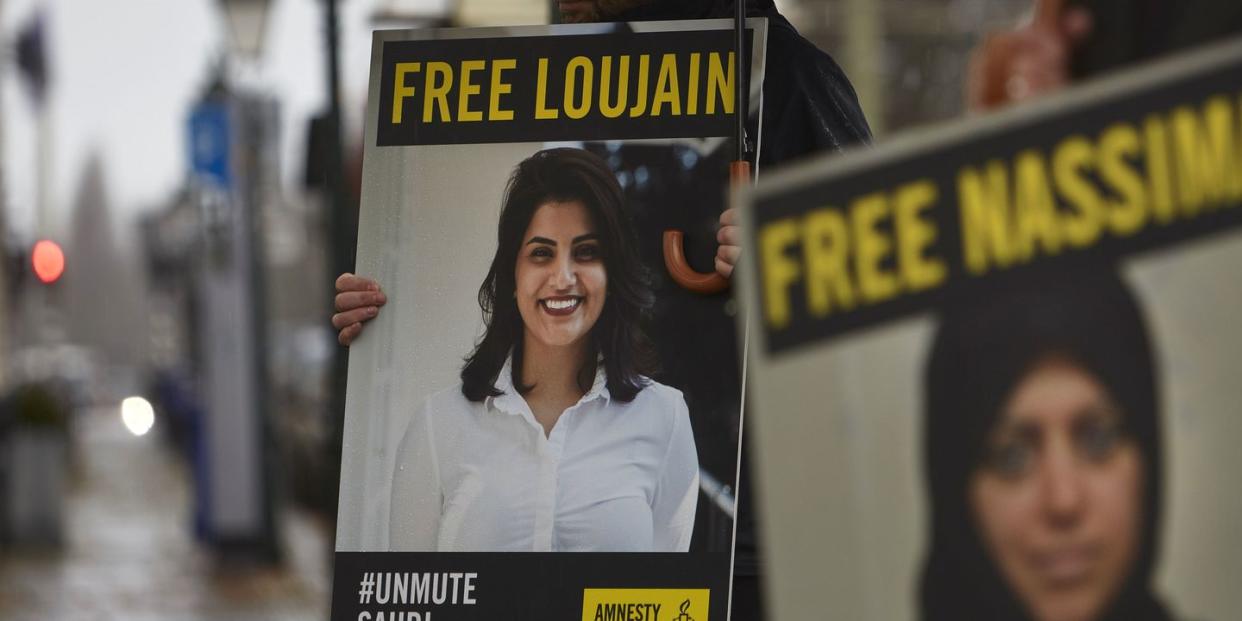Saudi Activist Who Fought for Women's Driving Rights Has Been Sentenced to Nearly Six Years in Prison

The world has come to know Loujain al-Hathloul as one of Saudi Arabia's most prominent activists, fighting for women to have the right to drive and be freed from the kingdom's formerly restrictive guardianship system. In the spring of 2018, she was arrested alongside other activists shortly before the driving ban was officially lifted. As of Monday, December 28, she's been sentenced to five years and eight months in prison, a month after her case was transferred to a Saudi terrorism court. According to the New York Times, Hathloul was charged with undermining the kingdom and its political system and pushing for women’s rights.
"My sister is not a terrorist, she is an activist," her sister, Lina al-Hathloul, said in a statement, per the Times. "To be sentenced for her activism for the very reforms that MBS and the Saudi kingdom so proudly tout is the ultimate hypocrisy," she continued, referring to Saudi crown prince Mohammed bin Salman.
This is me and my sister @LoujainHathloul, last time I saw her in Dec2017, Riyadh.
She’ll be spending her 920th day in prison when SA will be hosting the #G20 summit. Is anyone going to ask about her?
16 days that Loujain is on a hunger strike.We don’t have any news of her since pic.twitter.com/2ddYAmDS98— Lina Alhathloul لينا الهذلول (@LinaAlhathloul) November 11, 2020
Though Saudi officials say there's no tie between Hathloul's arrest and her activism, rights groups view her arrest as "punishment for her political advocacy," according to the Times. Hathloul, 31, is one of the country's most well-known activists and had been outspoken about lifting the ban on women driving and about the guardianship system, which previously prevented women from traveling abroad without the approval of a male relative.
At the time of her 2018 arrest, journalist Mona Eltahawy wrote: "Saudi Arabia’s highest authorities apparently want to make it clear that it was not the courageous advocacy of those feminists that led to this moment, when the kingdom is about to finally lift its ban on women driving, but rather the grace of a crown prince engaged in ferocious revisionism. To allow feminists to celebrate what is, in all regards, a victory of their years of activism would nurture the idea that activism works—a truism that authoritarians hate."
Even after being detained, Hathloul refused to keep quiet and joined other activists in telling Saudi judges they had been sexually assaulted and tortured while being interrogated. The women allege they were waterboarded, electrocuted, and threatened with rape. According to Al Jazeera, her family said Saudi authorities offered to release Hathloul in 2019 if she testified on video that she had not been tortured or sexually harassed, but she refused. Last week, a judge rejected her complaint about the alleged torture, according to the Times, and Saudi officials have denied the allegations.
Though she was sentenced to nearly six years in prison, her family has said she could be released in about two months with time already served, as the judge suspended 34 months of her sentence. It's also been reported that after her sentence, Hathloul will be barred from leaving the kingdom for five years and will face three years of probation.
#SaudiArabia: Conviction and 5yrs 8 month sentence handed down to prominent women’s rights campaigner #LoujainAlHathloul, already arbitrarily detained for 2 ½ years, is also deeply troubling. We understand early release is possible, and strongly encourage it as matter of urgency.
— UN Human Rights (@UNHumanRights) December 28, 2020
Back in March, Lynn Maalouf, Amnesty International’s Middle East research director, said of Hathloul's trial: "The very existence of this sham trial pulls the veil off of the authorities’ so-called push for reforms in the Kingdom. How can they initiate change in the country when the very women who fought for these reforms are still being punished for it?"
You Might Also Like

